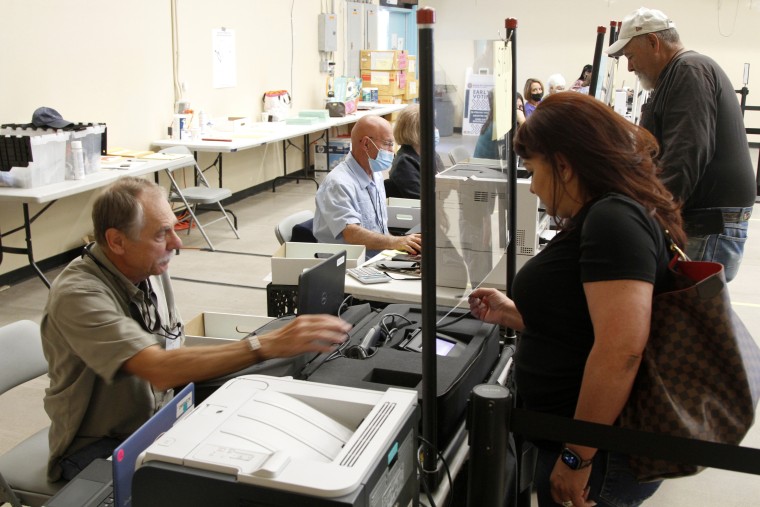The good news is, local officials in a New Mexico county followed a court order and grudgingly certified legitimate election results. The bad news is, no one should see this as an all's-well-that-ends-well story. NBC News reported late last week:
Officials in Otero County, New Mexico, voted to certify primary election results on Friday in compliance with a state Supreme Court order after refusing to do so, citing concerns about voting machines. In a 2-1 vote, the Republican-led commission certified the county’s results from its June 7 primary.
For those who might need a refresher, let’s briefly recap how we arrived at this point.
New Mexico held primary elections two weeks ago, and the process was largely unremarkable. Candidates ran, voters participated, ballots were counted, and election results were announced. It couldn’t have been more routine.
There was, however, one notable exception: In Otero County, Republican commissioners refused to certify local results because they believed weird conspiracy theories about voting machines.
They weren’t aware of any problems with the vote tallies or the local election equipment, but they refused to certify the results anyway because of their unsubstantiated feelings.
This did not sit well with New Mexico’s secretary of state, Democrat Maggie Toulouse Oliver, who went to the state Supreme Court, asking the justices to order Otero County commissioners to certify the results. The justices agreed and directed local officials to do their job by the end of the week.
Vickie Marquardt, a commissioner who said in her “heart” she suspected that the conspiracy theories had merit, eventually reversed course — not because she’d been persuaded by evidence or reason, but because she feared possible criminal prosecution.
Friday’s vote was not, however, unanimous: Otero County commissioners voted 2-1 to certify the results. The dissenter was Couy Griffin, founder of “Cowboys for Trump,” who, coincidentally, was also sentenced on Friday to 14 days in jail and a $3,000 fine for his role in the Jan. 6 attack. (He participated in the local vote by way of telephone.)
Griffin, explaining that he relied on “intuition,” added on Friday, “My vote to remain a ‘no’ isn’t based on any evidence. It’s not based on any facts.”
Good to know.
So, crisis averted, right? A court told these local GOP officials to do their duty, the board grudgingly followed the court’s directions, and that’s that? At face value, yes.
But stepping back and considering the larger context, it’s not quite that simple.
It’s worth asking, for example, what would’ve happened if New Mexico had a far-right election denier in the secretary of state’s office. That may seem unlikely — New Mexico is a relatively blue state — but there are far-right election deniers running for secretaries of state throughout the country in 2022, and if they take office, it’s very easy to imagine the Otero County mess playing out in a more dangerous way
“We dodged a bullet here,” Toulouse Oliver told NBC News on Friday night, adding that the state’s laws and the court’s action prevented “the system from completely breaking down.”
But what happens when we’re confronted with a political dynamic in which Republican conspiracy theorists are in control of an election system, and they’re comfortable with a complete breakdown? How many Otero-like debacles should Americans expect to see in other areas in the coming months?
An Associated Press report last week described the mess in New Mexico as “a preview of the kind of chaos election experts fear is coming in the fall midterms and in 2024.”
The article quoted Jennifer Morrell, a former election official in Colorado and Utah who now advises federal, state and local officials, saying, “We are in scary territory. If this can happen here, where next? It’s like a cancer, a virus. It’s metastasizing and growing.”
I’m glad things worked out in Otero County, but I’m far from reassured about the prospect of related breakdowns in the near future.

